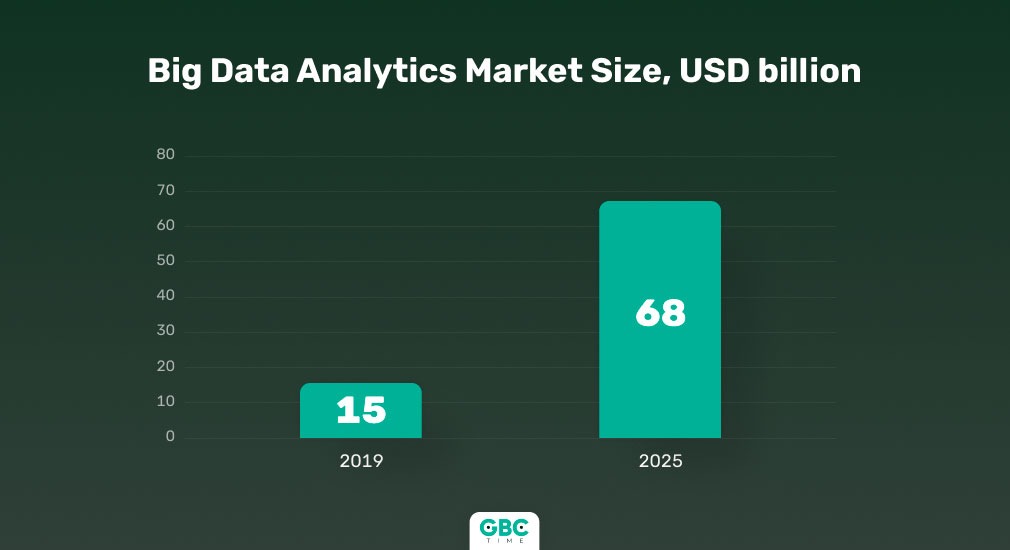The online gambling industry is a high-evolving branch of the economy, impacted by modern technologies and the latest developments. And in recent years, artificial intelligence (AI) has become one of the most prominent developments influencing online casinos. The iGaming studios try to implement it in slots and other games, gambling platforms use AI for multiple purposes as well. You can learn about the technologies that are likely to affect the gambling niche here.
Statista reports the massive growth and improvement of artificial intelligence algorithms over the past few years. According to the site, the main driver for such growth is the development of bid data and the digitalization of the economy overall.
The big data analytics market is expected to grow to $68 billion by 2025. This is compared to $15 billion in 2019.

The amount of big data generated in the world is also breathtakingly huge. It grows by 40% each year and is predicted to reach 163 trillion GB by 2025.
Seeing that, the role of artificial intelligence algorithms in the modern world cannot be underestimated. In this article, we are going to take a deeper look at how artificial intelligence can be applied in the iGaming industry and, namely, how it can be used for slot development.
What is artificial intelligence?
Britannica dictionary defines artificial intelligence as the ability of a computer algorithm or other machine to perform the task associated with human or animal intelligence, such as reasoning, generalizing, or learning from previous experiences. Some AI experts also claim that these networks do not mimic human behavior but rather act naturally.
The AI ecosystem includes:
- Machine learning, where algorithms process a massive amount of data to learn and apply the knowledge to new data to predict the outcome of events or more;
- Robotics, where artificial intelligence is used to create and operate robots. These machines are usually used to interact with people or even manipulate more complicated situations. Some examples include delivery robots, robots that help people in retail stores, restaurant robots, and security robots.
- Artificial neural networks imitate the work of the human brain. Similar to a brain, this network has connected neutrons linked to each other.
While at first, it was perceived positively, with time some people raised concerns about its safety.
Nowadays, AI algorithms are used in many fields and are integrated into our everyday life. The most common uses of artificial intelligence include:
- Search engines like Google or Bing;
- Online translation;
- Recommendation algorithms on YouTube, Netflix, or TikTok;
- Voice virtual assistants such as Siri or Alexa;
- Autopilot in cars, e.g., Tesla;
- Automatic decision-making;
- Strategic games like online chess.
Weak AI
The specialists distinguish two types of AI – strong and weak. The weak ones are limited to the pre-defined functions and operate within this rage. Their programs do not cover the full capabilities of a human brain and cannot work independently outside of their functionality. They still resolve complex tasks but generally are programmed to do so. The perfect example of this is voice assistants such as Siri or Google Assistant.
Strong AI
At the same time, strong AI programs are capable of making decisions of their own and learning from their mistakes. This is, however, only a hypothetical concept, which is often shown in movies like Terminator or Her.
Pros and cons of artificial intelligence
| Advantages | Disadvantages |
| Deep analysis of data | High cost of implementation |
| Increased efficiency of the decision-making process | Lack of creativity |
| Reduction of human errors | Does not improve with the time |
| Optimization of processes | Reduction of employment |
The use of AI and iGaming
The online gambling industry is constantly evolving and developing. It encompasses the world’s most progressive technologies like virtual reality, web3, NFTs, cryptocurrencies, etc.
And artificial intelligence is not an exception. As casino platforms typically collect detailed information about their users (name, banking information, address, credit information, game preferences), they can leverage this knowledge by applying AI. The most progressive virtual gambling platforms utilize AI algorithms to maximize their financial results, retain users, safeguard the users’ experience on the site, and even prevent gambling harm. Let’s take a look at the most common ways to use AI in the iGaming niche.
Data Robot classifies the following cases of AI use in the gaming industry.
1. Risk management
The Ai-powered models can identify cheaters by monitoring players’ and casino employees’ behavior. This way, a company can avoid a huge revenue loss and safeguard itself from other risks.
2. Anti-money laundering
Money laundering and terrorist financing are among the main concerns of online casino operators. In this case, the companies can use an AI-powered program to automatically detect suspicious transactions and identify non-legitimated behavior.
3. Increasing player’s lifetime value
One of the main goals of online casinos is to keep players coming to their sites and encourage them to play more. AI algorithms analyze players’ preferences, and their behavior on the site and deliver a personalized offer just for them. This way, a player is not shown just random slots or the most popular slots but a selection of games of chance they might like or the ones similar to what they played before. These models work almost like YouTube’s recommended feed.
Besides, machine learning algorithms can identify players that are not likely to visit a casino after the first visit. The models also can deliver personalized offers that will bring players back to the gambling site.
4. Predicting future behavior of players
As mentioned before, online casinos use artificial intelligence to analyze players’ behavior. So, with these algorithms, gambling operators can predict when a user will play next time, what kind of games they will select, how much they will deposit, and how long are they likely to stay on the site.
With all that knowledge, iGaming companies can amend their marketing strategy and make targeted offers to a specific audience at a specific time.
5. Casino optimization
This approach is equally useful for land-based and online casinos. Utilizing AI, gambling establishments can optimize their offers. Brick-and-mortar casinos can determine a perfect location for each gaming machine based on player demand. Virtual casinos can put the most popular games on their main page, for instance.
6. Creating more immersive gameplay
Not only online casinos but iGaming studios can incorporate AI in their products. It can help create more engaging and realistic gameplay, enhancing sound effects, graphics, and amination. Slot providers, however, haven’t used AI in their games yet.
7. Player protection
Most high-end gambling establishments also care about players’ well-being and aim to safeguard them from the threats of gambling addiction. AI algorithms can play a vital role in player protection, detecting early signs of dangerous behavior. This way, a casino can intervene before it is too late.
Conclusion
Artificial intelligence is a powerful and quite useful technology that can change the future of online gambling. When combined with the latest iGaming technologies, it can maximize players’ experience at online casinos while safeguarding online casinos from risk. We will likely see more common use of AI in the online gambling sphere in the coming years.












